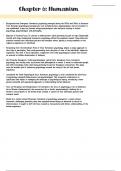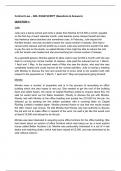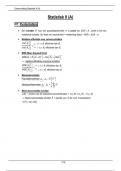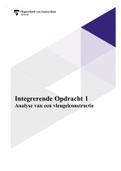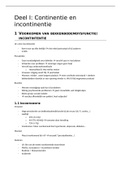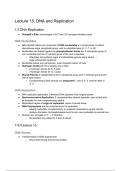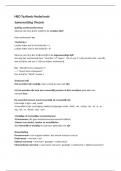Chapter 6: Humanism
• Background and Emergence: Humanistic psychology emerged during the 1950s and 1960s as deviation
from dominant psychological perspectives such as behaviourism, psychoanalysis, and structuralism. It
was established, in part, by German refugee psychologists who had prior training in Gestalt
psychology, psychoanalysis, and philosophy.
• Rejection of External Focus: In contrast to behaviourism, which primarily focused on input (observable
stimuli) and output (responses), humanistic psychology shifted the emphasis inward. They redirected
attention towards how individuals perceive and interpret events, placing a strong emphasis on the
subjective experiences of individuals
• Personality from the Individual's Point of View: Humanistic psychology adopts a unique approach to
the study of personality. They study personality from the point of view of the individual's subjective
experience. This shift in focus represents a departure from other psychological schools that focused
on external or hidden determinants of behavior.
• Not Primarily Therapeutic: Unlike psychoanalysis, which had a therapeutic focus, humanistic
psychology was initially more sociocultural and philosophical in nature. It aimed to understand people
and offer knowledge rather than being primarily focused on therapeutic intervention. This aligns
with the broader goal of redirecting psychology towards the study of the self and human
experience.
• Considered the Third Psychological Force: Humanistic psychology is often considered the third force
in psychology, alongside behaviourism and psychoanalysis. This recognition underscores its
significance and impact in reshaping the landscape of psychological inquiry, introducing a more
person-centeredd and experiential approach to understanding human behaviour.
• Focus on Perception and Interpretation: For humanists, the focus of psychology is not on behaviour
(as in Skinner's behaviourism), the unconscious (as in Freud's psychoanalysis), thinking (as in
Wundt's structuralism), or the human brain. Instead, it centers on how individuals perceive and
interpret events
• Raised as a Contra-cultural Movement: Humanism in psychology emerged as a contra-cultural
movement, challenging prevailing ideas that regarded human beings as abnormal or devoid of
distinctiveness. It sought to shift the focus towards a more positive and holistic understanding of the
human experience.
, • Refusal of Animal Experimentation: Humanists rejected the use of animal experimentation as a method
in psychology. The rationale was that such methods exclude the unique and complex nature of human
experiences. Instead, humanism emphasizes studying human nature directly and respecting the
individuality of human subjects.
• Study of Relevant Matters to Human Being: Psychology should prioritise the study of matters that are
relevant to human beings, regardless of whether they have proper experimental tools to do it. This
reflects a commitment to understanding the richness of human experiences and the subjective nature
of psychological phenomena.
• Focus on Internal Subjective Experiences: The objective of humanistic psychology is to study internal
subjective experiences rather than merely observing external behavioral manifestations. This shift in
focus highlights the importance of understanding the inner world of thoughts, feelings, and personal
experiences to gain a comprehensive understanding of human psychology.
• Rejection of Distinction Between Theory and Applied Psychology: Humanism in psychology argues
against a rigid distinction between theoretical and applied psychology. It emphasises that theories
should be directly applicable and beneficial to the real-life experiences of individuals, promoting a more
practical and holistic approach to psychological understanding.
• Individual Cases over Averaged Data: Humanistic psychology advocates for research that is grounded in
individual cases rather than relying solely on averaged data. This approach recognizes and values the
uniqueness of each individual's experience, encouraging a more personalized understanding of
psychological phenomena.
• Focus on Enriching Life: The goal of humanistic psychology is to focus on what is required for an
individual to enrich their life. This emphasizes the positive aspects of human experience and the
potential for personal growth and self-actualization.
In summary, humanistic psychology, which emerged as a distinctive force in the mid-20th century,
redirected attention inward, focusing on the individual's subjective experience. Challenging prevailing
paradigms, it offered a more holistic and person-centered perspective. This approach challenges traditional
views by insisting on a positive and comprehensive understanding of human beings. Humanism in
psychology promotes the study of individual, subjective experiences, rejects rigid distinctions, and
underscores the central objective of psychological inquiry—enriching individuals' lives.
• Background and Emergence: Humanistic psychology emerged during the 1950s and 1960s as deviation
from dominant psychological perspectives such as behaviourism, psychoanalysis, and structuralism. It
was established, in part, by German refugee psychologists who had prior training in Gestalt
psychology, psychoanalysis, and philosophy.
• Rejection of External Focus: In contrast to behaviourism, which primarily focused on input (observable
stimuli) and output (responses), humanistic psychology shifted the emphasis inward. They redirected
attention towards how individuals perceive and interpret events, placing a strong emphasis on the
subjective experiences of individuals
• Personality from the Individual's Point of View: Humanistic psychology adopts a unique approach to
the study of personality. They study personality from the point of view of the individual's subjective
experience. This shift in focus represents a departure from other psychological schools that focused
on external or hidden determinants of behavior.
• Not Primarily Therapeutic: Unlike psychoanalysis, which had a therapeutic focus, humanistic
psychology was initially more sociocultural and philosophical in nature. It aimed to understand people
and offer knowledge rather than being primarily focused on therapeutic intervention. This aligns
with the broader goal of redirecting psychology towards the study of the self and human
experience.
• Considered the Third Psychological Force: Humanistic psychology is often considered the third force
in psychology, alongside behaviourism and psychoanalysis. This recognition underscores its
significance and impact in reshaping the landscape of psychological inquiry, introducing a more
person-centeredd and experiential approach to understanding human behaviour.
• Focus on Perception and Interpretation: For humanists, the focus of psychology is not on behaviour
(as in Skinner's behaviourism), the unconscious (as in Freud's psychoanalysis), thinking (as in
Wundt's structuralism), or the human brain. Instead, it centers on how individuals perceive and
interpret events
• Raised as a Contra-cultural Movement: Humanism in psychology emerged as a contra-cultural
movement, challenging prevailing ideas that regarded human beings as abnormal or devoid of
distinctiveness. It sought to shift the focus towards a more positive and holistic understanding of the
human experience.
, • Refusal of Animal Experimentation: Humanists rejected the use of animal experimentation as a method
in psychology. The rationale was that such methods exclude the unique and complex nature of human
experiences. Instead, humanism emphasizes studying human nature directly and respecting the
individuality of human subjects.
• Study of Relevant Matters to Human Being: Psychology should prioritise the study of matters that are
relevant to human beings, regardless of whether they have proper experimental tools to do it. This
reflects a commitment to understanding the richness of human experiences and the subjective nature
of psychological phenomena.
• Focus on Internal Subjective Experiences: The objective of humanistic psychology is to study internal
subjective experiences rather than merely observing external behavioral manifestations. This shift in
focus highlights the importance of understanding the inner world of thoughts, feelings, and personal
experiences to gain a comprehensive understanding of human psychology.
• Rejection of Distinction Between Theory and Applied Psychology: Humanism in psychology argues
against a rigid distinction between theoretical and applied psychology. It emphasises that theories
should be directly applicable and beneficial to the real-life experiences of individuals, promoting a more
practical and holistic approach to psychological understanding.
• Individual Cases over Averaged Data: Humanistic psychology advocates for research that is grounded in
individual cases rather than relying solely on averaged data. This approach recognizes and values the
uniqueness of each individual's experience, encouraging a more personalized understanding of
psychological phenomena.
• Focus on Enriching Life: The goal of humanistic psychology is to focus on what is required for an
individual to enrich their life. This emphasizes the positive aspects of human experience and the
potential for personal growth and self-actualization.
In summary, humanistic psychology, which emerged as a distinctive force in the mid-20th century,
redirected attention inward, focusing on the individual's subjective experience. Challenging prevailing
paradigms, it offered a more holistic and person-centered perspective. This approach challenges traditional
views by insisting on a positive and comprehensive understanding of human beings. Humanism in
psychology promotes the study of individual, subjective experiences, rejects rigid distinctions, and
underscores the central objective of psychological inquiry—enriching individuals' lives.

